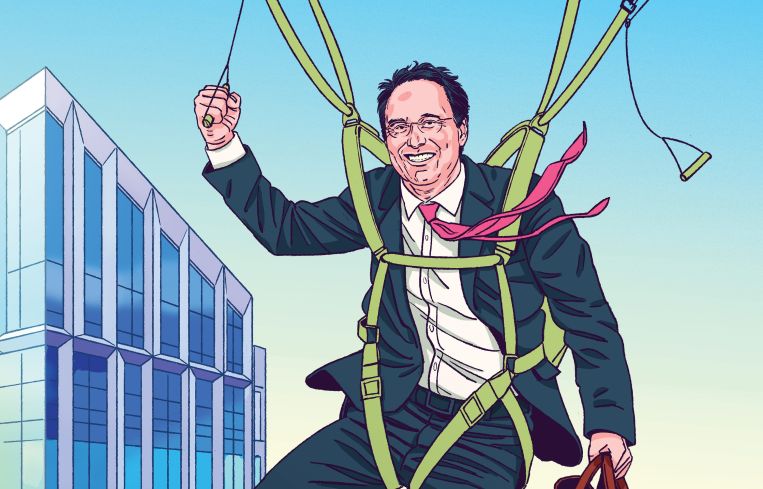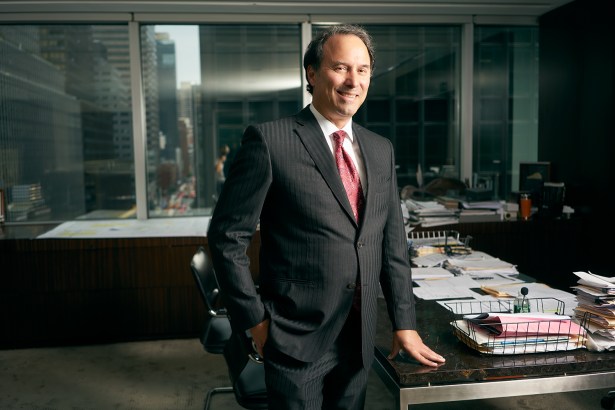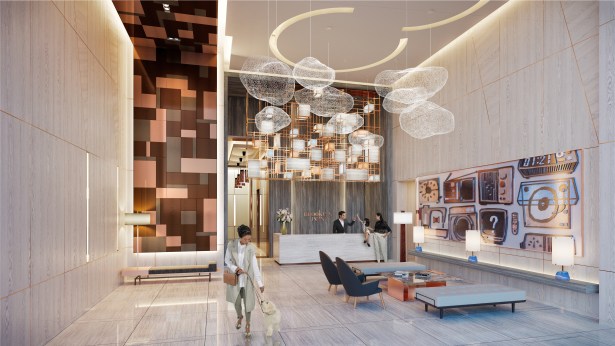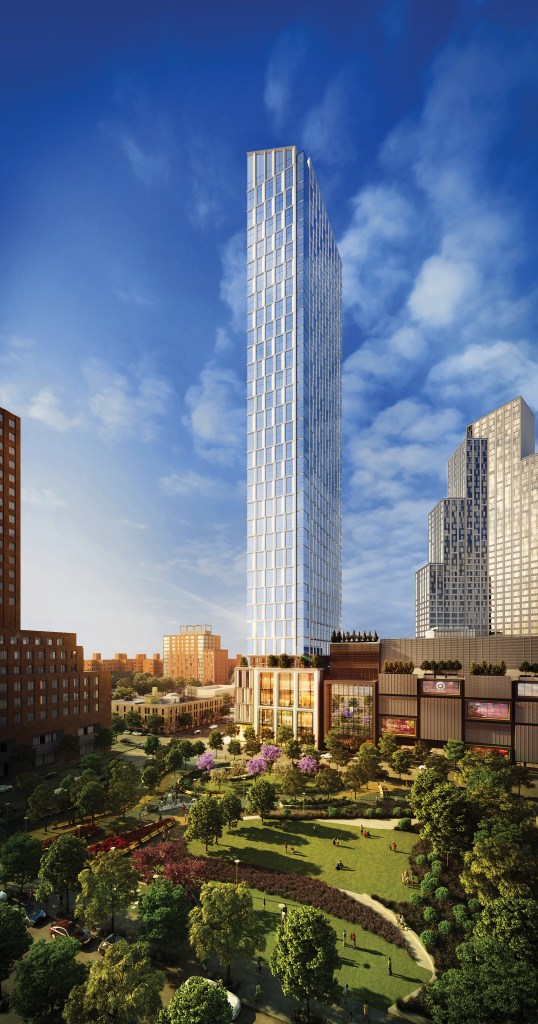Barnett Takes Brooklyn: Biggest Name in Luxe Development Drops Into Kings County

Real estate sounds like it was a side hustle for Gary Barnett when he started.
The head of the 29-year-old Extell Development Company was living in Belgium working in his in-laws’ diamond business when the idea of investing in New York real estate came up.
The diamond business “generated a good lifestyle,” Barnett told Commercial Observer. “My in-laws were reasonably well off. But it was a very limited business…I was looking for something that was interesting.”
What about investing in real estate? Relatives and other local Belgian investors from the diamond, real estate and electronics business figured that as an American “I have to know everything about American real estate. Of course, I knew very little about anything. But I learned—and here I am.”
Even today, the 62-year-old Barnett seems unfazed stepping into the unknown. Barnett spoke to CO from the sales gallery of his newest building, Brooklyn Point, the massive condominium at 138 Willoughby Street that promises to be the tallest tower in Brooklyn when it’s finished in 2020. The fact that he’s building in Kings County makes it out of the ordinary for Barnett.
Since he redeveloped the Belnord at 225 West 86th Street in the early 1990s with Ziel Feldman (now of HFZ) and Kevin Maloney (of Property Markets Group), Barnett’s name has been synonymous with Manhattan luxury development.
How else could one think of the developer of One57, the 75-story Christian de Portzamparc-designed hotel and condo on West 57th Street that sold a $100.5 million unit to billionaire Michael Dell earlier this year as the Wall Street Journal first reported, and turned 57th Street into the most expensive stretch of residential real estate in Gotham? Or the man who’s doing a follow up just down the block with Central Park Tower at 225 West 57th Street, the second tallest building in the U.S. (one foot shorter than 1 World Trade Center)? Or the builder who’s trying to forge a luxury neighborhood out of Two Bridges with his One Manhattan Square condo?
Barnett is notoriously tight-lipped about his personal life. In a story from 2010 New York magazine revealed that he grew up in Monsey, N.Y. (where he lives now) and attended Queens College and Hunter College, which he declined to confirm for CO. (Or say anything about his wife and children.) And he can shut down questions of deals-in-progress (he declined to comment on last week’s news in The Real Deal that 555 10th Avenue is going on the market). But he can also be freewheeling on the subject of, say, his foray into the Israeli bond market.
Barnett discussed that and more, but we started with Brooklyn Point.

Commercial Observer: Tell us why you wanted to develop in Brooklyn.
Gary Barnett: We had never done anything in Brooklyn. Every time I looked at where the market was I said, even with land nearly free it’s hard to make the numbers work. But we are always looking for something of size to come into the market. And over the last several years Brooklyn numbers have gone way up. The rents are getting close to Manhattan rents. Condo prices were shy [of Manhattan figures], but those are also starting to creep closer to Manhattan condo prices. So we looked at it. This was a particularly special opportunity because it’s sitting on top of the City Point mall and food court—and it’s perfectly located because of the subway system. I don’t know how many subway lines—maybe 10?—right down stairs. And it was of size—six or 700,000 square feet total. And because it had been in a development zone…and a long-term tax abatement that was attractive to us as well. All that combination of things [made us say], “you know what? We can do an Extell product—very beautiful, high end, well designed, high quality, large and still have margin for profit.” And hopefully that will be the case.
Who do you think are the buyers for these kinds of apartments?
Almost everybody. There are no more distinct neighborhoods or distinct demographics going to a particular neighborhood. Almost everybody is ready to live everywhere. There are so many beautiful neighborhoods. In the old days, 20, 30 years ago, it used to be, I’m Upper West Side, or I’m Upper East Side. I’m Downtown. I’m Tribeca. But now there are so many good neighborhoods that are starting to turn into exciting places to live that there’s not that much of a distinction. You’re not necessarily going to see multi-billionaires buying in City Point. But they might buy for their kids. We definitely see an investor market, ‘cause you can see a reasonable return on your investment here. But there’s almost nobody today who wouldn’t buy in most of the neighborhoods in Manhattan and also Brooklyn.

Are you seeing the same level of foreign investors?
We’re still seeing a very good level of foreign investment from all over the world. The interest has not stopped. The Chinese are finding it harder to get money out of the country, but they’re still extremely interested in investing in New York real estate. It’s time tested. It’s the capital of the world. You can get a reasonable return on investment—not a big return, but a reasonable return. And it’s a great place to store a percentage of your wealth. There’s definitely a foreign element of the market that is buying, not for personal use now—but maybe for a child’s use, or maybe a place to retire. Or maybe simply a place to get a better return than they’d get in the bank and to feel safe that their money is well situated and protected from inflation.
Will the luxury condo market ever be the same? Is it going to recover? Are things trading?
The super-luxury market—I don’t say the luxury market, I say the super-luxury market. I define that as buildings where the average is $5,000 [per square foot] and up. Things are trading, things are getting sold, there’s not much new product there. It’s going to be fine. We’re chipping away at One57; 432 [Park] is just about sold out; 220 [Central Park South] is taking the market to new heights, right? It’s supposedly averaging over $8,000 a square foot and well sold. So 520 Park Avenue is getting well sold. Also very high numbers. So, no, I think the super-luxury market is very healthy, very in demand. [But] people are taking more time. In many cases, a building’s been around a little bit—they want a discount. But we’re very optimistic about the super-luxury market. Central Park Tower is coming online this fall and we expect it to do very well.
Tell us a little why you wanted to get into the Israeli bond market.
Because it was a market that appreciated real estate, actually loves real estate. And they have a very mature and active bond market that will finance real estate.

Why do you think that is?
They’re a development country, getting wealthier and wealthier. If you go to Tel Aviv, or any of the big cities, there’s enormous development going on, so the real estate companies have been a very substantial part of the economy for a long time and for whatever reason they are used to financing real estate companies and the debt market—but they were interested in expanding that, so they were ready to finance real estate companies in America as well. We weren’t the initiator of it—but we were the first ones to come in in a big way at once. That really put it on the map. All of a sudden people were saying, oh, my gosh, Extell has gone to Israel; they raised $300 million in financing and then we raised another $150 million. So everybody kind of piled in. Personally, I think they ought to be more careful. I think people really, really need to do their homework before they decide which company’s bonds they’re going to buy.
Were you happy with Extell’s offering? The terms and how it all turned out?
I would say that all’s well that ends well. We were happy with the initial execution. We were happy with the terms of our financing. Obviously we had a downdraft in the last couple of years because people perceived that we had more risk. We never thought that we were at risk but that’s what the market thought. But things have picked up again. We executed. And as they realized how good the quality of our assets are and are continuing to build, the bonds have gone back up. I have to say, I am disturbed and upset that we had initial bond buyers that sold at losses. The bonds did go down, and people got nervous, and they probably sold at a loss. And I feel bad about that. We were maybe too honest with the market. When we said we had a risk factor they had a tendency to magnify the risk factor maybe more than they should have. When we said, no, we’re comfortable that our assets are so good and our tremendous level of equity is so high there are not going to be any issues of bond repayment, I think they maybe didn’t believe that. And so that’s why pricing went down and why people sold out. But everything that we’ve predicted and hoped for has come true and we’re set to pay. We’ve converted into shekels $150 million already. We’re set to repay a third of the [$150 million] debt this year.
Speaking of risk, are you girding yourself for any downturn in the market or a recession?
“Girding?” That’s a strong word. This is a cyclical business. Notwithstanding the fact that the economy is booming and New York City is booming, it’s a cyclical business. For a period of years you had interest rates that were near zero. And when that happens the alternative to financial investments are going to be extremely attractive. Real estate was one of those alternative investments. People would say, I get zero in the bank—whatever I get in real estate is going to be good. In the last couple of years we’ve definitely seen an oversupply coming onto the market. And that’s where we are today. The market is oversupplied but New York is booming and we are absorbing supply at a decent rate. And I think we’re seeing supply slowing down now quite substantially. There are projects that are in the works but not much new stuff is getting done. You have to be able to withstand perhaps pricing going down—I think pricing has come down, 10, 15, 20 percent. I’m not talking about stuff that was crazy overpriced. That never made sense, and makes less sense today. Some of those buildings are going to have very sharp drops because they’re not good buildings. But even the good stuff that was priced three years ago or four years ago, that’s going to be down 10, 15, 20 percent.
At One 57 the lower floor units, the smaller units, we’re doing probably 8 to 10 percent discounts. But the bigger units might be a 15 percent discount, because they were priced in a higher market. Central Park Tower, for example, we think we have very attractive pricing. And we can afford to price it for the market. Some of these developers just can’t afford to take their pricing down. They’ll either make no profit or lose money.
Our newer stuff—like Brooklyn Point, is selling very nicely, and it’s priced for the market. One Manhattan Square, priced for the market, is selling well. So I think it’s a question of being strong enough financially, having a healthy enough basis, getting your buildings built up at a high-quality level, and then you wait it out. If it takes you another year to sell then it takes you another year to sell and that’s that. And I think there are a bunch of developers who may come under pressure to have to sell out and walk away, make no profit, maybe even lose money—and maybe it’s the mezzanine lender who winds up with the property.
Do you think that will happen on the West 57th Street corridor?
Not at all. There’s only one project on 57th Street corridor that I could see being in trouble in the super-luxury market.
Could I ask you which one?
No. I’m sure you’ll figure it out.
I have my ideas.
Nothing in the super-luxury other that that—maybe some Downtown projects that could wind up having trouble. It’s the projects that are highly leveraged—that’s very expensive money that’s ticking. Some of these guys are taking 18, 20 percent mezz money. If your project goes a year or two extra, you’re out of luck. It just ate you alive. It’s like financing on your credit card.
You mentioned One Manhattan Square—tell us why you like that neighborhood?
We liked it because it is five minutes, maybe less, from the F train. Great transportation. You’re on the FDR. You’re in walking distance from the Financial District. It’s a starting point of the First Avenue bus. So the transportation’s very good. But mostly I liked it because of the unbelievably spectacular views.
Central Park Tower has the most amazing views of Midtown and the park. One Manhattan Square doesn’t have Central Park, it’s true, but it has unbelievable views of the water, the bay, the ocean and the whole city—Midtown, Downtown and everything in between from a distance.
The other thing we liked about it was it was a very large footprint. So it was a two-acre site—imagine talking about “acres” in New York City! So we were able to do something amazing and create its own village, its own vertical village. We’ve got over 800 units, we’ve got 100,000 square feet of amenities—everything under the sun. We’re going to have hopefully a very good food store downstairs. So you really have everything you could possibly ask for.
Has that also seen a lot of international buyers?
For sure—we see that in every building. Even the buildings that you wouldn’t think would see international buyers like The Kent, [at 200 East 95th Street].
Has the perception of the American market at all changed for international buyers since President Donald Trump assumed office?
I don’t think so. I don’t think it’s Trump. I think there’s a little bit of a chilling effect because we keep on talking, talking, talking about money laundering and stuff in real estate. People who are completely aboveboard don’t want questions about their business and about their private life. That could have a little bit of a chilling effect. I, myself, have never heard anything so nonsensical. And the interesting thing is: you don’t see it. You don’t see any quotes coming out of the FBI or criminal agencies about money laundering—that they’re upset about money laundering and you shouldn’t let foreigners buy real estate. They love it if foreigners buy real estate. And [if they’re discovered to be criminal] we’re going to take their real estate away! They can’t put that in their backpack and get on a plane. What are they concerned about? They’re concerned about diamonds. They’re concerned about artwork. They’re concerned about bitcoin. Those are the things that people are mobile with. You’re not mobile with real estate. You invest your money in a New York condo, you’re not going anywhere with it. Jho Low [the fugitive Malaysian financier accused of money laundering]—they’re taking away his Time Warner condo!
You’ve been in litigation with Trump in the past…
I have to tell you, if you’ve been in real estate and interacted with Donald Trump and were not sued, you were doing something wrong.
I think we have to end it on that quote.


